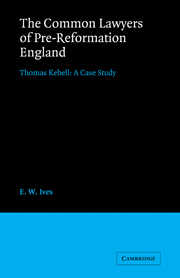Book contents
- Frontmatter
- Contents
- List of figures and tables
- Preface
- Abbreviations
- Manuscript sources
- Table of cases
- Introduction
- PART I THE LEGAL PROFESSION
- PART II LEGAL PRACTICE
- PART III THE LAWYERS AND THE LAW
- PART IV THE PROFESSION AND SOCIETY
- 13 The rewards of the profession: fees and payments
- 14 The rewards of the profession: income and morality
- 15 The rewards of the profession: the estates of Thomas Kebell
- 16 The rewards of the profession: Humberstone Manor
- 17 Social mobility: the Kebells of Humberstone
- 18 Thomas Kebell and the pre-Reformation legal profession
- Retrospect
- Appendices
- Index
18 - Thomas Kebell and the pre-Reformation legal profession
Published online by Cambridge University Press: 05 November 2011
- Frontmatter
- Contents
- List of figures and tables
- Preface
- Abbreviations
- Manuscript sources
- Table of cases
- Introduction
- PART I THE LEGAL PROFESSION
- PART II LEGAL PRACTICE
- PART III THE LAWYERS AND THE LAW
- PART IV THE PROFESSION AND SOCIETY
- 13 The rewards of the profession: fees and payments
- 14 The rewards of the profession: income and morality
- 15 The rewards of the profession: the estates of Thomas Kebell
- 16 The rewards of the profession: Humberstone Manor
- 17 Social mobility: the Kebells of Humberstone
- 18 Thomas Kebell and the pre-Reformation legal profession
- Retrospect
- Appendices
- Index
Summary
For Francis Bacon, ‘just and parfitte historie’ had three forms–the chronicle of a ‘time’, the ‘life’ of a person and the narrative of an ‘action’, and this book is none of them, particularly it is not a ‘life’ of Thomas Kebell. But it is impossible to investigate over more than two decades the career of a single individual, so that any index automatically falls open at the letter ‘K’, without wanting to know something of the man himself. And here is temptation. It is all too easy to disguise ignorance with probability–‘some others were, therefore Kebell was’–or to invest the known with plausible imaginative colour–‘In June 1484 Kebell rode to Kirby Muxloe with a heavy heart’–or to exaggerate a supporting role–‘Kebell was present, therefore Kebell did’. Much of our evidence must come from the year books, and J.H. Baker has warned that reports and the like
are not materials on which to assess character or ability–a judicial biography of that kind is only appropriate for those very few judges… whose contributions are marked and remarkable.
The caution is just, and even more true of counsel, so that discretion would leave the character and abilities of Kebell in that historical limbo of things we shall never know. But indiscretion is sometimes irresistible, and, for what they are worth, some speculative conclusions about Kebell's ideas, attitudes and personality can be offered.
- Type
- Chapter
- Information
- The Common Lawyers of Pre-Reformation EnglandThomas Kebell: A Case Study, pp. 394 - 417Publisher: Cambridge University PressPrint publication year: 1983

